Search
Showing 10 of 1954 results for NARSC 2016 conference registration fees student pre advance late July 2016
-
Marketing toolkits
On this page are links to a number of toolkits that you may find helpful as you look to market your education institution to international students.
Also, included are some toolkits to help you raise the profile and benefits of international education here in New Zealand.
Digital Boost
This is a free self-directed online learning platform, packed with short videos, live events and expert advice to help you grow your business and thrive in today's digital world. https://digitalboost.business.govt.nz/s/?language=en_NZ
NZ Story Toolkit
On this website, you will find free resources including images, footage, brand videos, infographics, presentations, research and how-to-guides to promote New Zealand offshore. New Zealand Story | New Zealand Story Group (nzstory.govt.nz)
Social Licence Toolkit
Check out ENZ's communications toolkit that helps you tell stories about the benefits of international education to New Zealanders. The significant impacts of COVID-19 mean international education needs increased public support to rebuild and recover, so it can help our country to do the same. By using unified messaging and telling shared stories, we can create a new international education story that captures the hearts and minds of the New Zealand public. Communicating the benefits of international education - toolkit | ENZ IntelliLab
Brand Lab
The ENZ Brand Lab is a rich source of images, videos and other marketing tools to help our industry partners promote New Zealand education. Home | Education NZ Brand Lab | The ENZ Brand Lab
-
Sign up to the Immigration New Zealand International Education email
People working with the international education sector can sign up to receive emails from Immigration New Zealand with information and updates on international education and immigration matters.
These emails are aimed at education providers and offshore agents acting for students but may be of interest to others involved with the international education sector.
Subscribe to updates & newsletters | Immigration New Zealand
-
EdTech famil programme provides eyes on New Zealand for innovation
The programme included visits to Singapore, Viet Nam and Indonesia by a New Zealand delegation that included nine companies. The nine companies had a diverse range of education expertise, products and services from cutting edge Neuroscience for early childhood education to delivering TV-style drama series for English language education young adults. Six core companies participated across the three counties - Language fuel, Neurofrog, Chasing time English, StepsWeb, Jix Reality, and PipiLearning, while three additional companies already in the regions Writers' toolbox,Komodo wellbeing and Kami, joined the Singapore programme for specific elements.
The programme included meetings with the Ministries of Education of all three countries, specifically to understand the digital adoption and education roadmaps of each. Singapore shared their Transformation of education technology masterplan 2030 as a capability multiplier for educators and learners, and Viet Nam shared their focus on and investment in technology and management systems and using education technology to build the human potential of their citizens. Indonesia shared their Super App which allows for their 646.2 thousand schools, 4.2 million teachers and lecturers and 71 million students to all benefit from the large-scale acceleration of an economy moving at pace with a firm policy that ‘no one is left behind’.
Alana Pellow, ENZ’s Business Development Manager, led the delegation and said that the programme was carefully put together to ensure the visit was as much about showcasing New Zealand’s expertise and innovation in EdTech as it was to learn about what other countries and leaders in this space are doing.
“Across the three countries, the EdTech companies had the opportunity to meet and visit education providers from schoolteachers and leaders, vocational education providers and universities to education enrichment centers. They also heard from New Zealand business leaders and government agencies in each region, as well as had briefings and networking with local EdTech owners to gain a deep understanding of the economic and EdTech landscapes in each country.
“The public, private and enrichment education landscapes, which offer significant opportunity for EdTech’s, was a great eye opener particularly in Early Childhood Education (ECE), English language, literacy and English language teacher’s space.
“For example, in Viet Nam it is not uncommon for parents to spend 30% of their income on education – including after school enrichment education such is the ambition of parents for their children,” said Alana.
The private school market across all three markets is viewed as particularly significant for New Zealand. During the visit, it was noted by a number of diverse education related professionals how the New Zealand EdTech group were subject matter experts with education specific capabilities and expertise across many areas from linguistics, literacy, English language, teaching, academic R&D and collaboration with recognised and respected global experts such as – Oxford University Press, Oxford University, Royal Melbourne Institute of Technology, National University of Singapore, Institute of Technolgy Education and the University of Auckland.
Interest in New Zealand’s Education Technology was picked up by the local press in Indonesia and Viet Nam, with Viet Nam in particular seeing 17 stories feature across its various media channels. This has provided valuable visibility of New Zealand’s innovation and expertise in digital education across a wide education subsector value base from ECE and K-14 to R&D at tertiary level. Positive leads have followed and the founder and CEO of SIS and Inspirasi schools, which has schools across Indonesia, South Korea, Myanmar, and India, has already been in touch with two of the NZ EdTech companies to explore future collaboration.
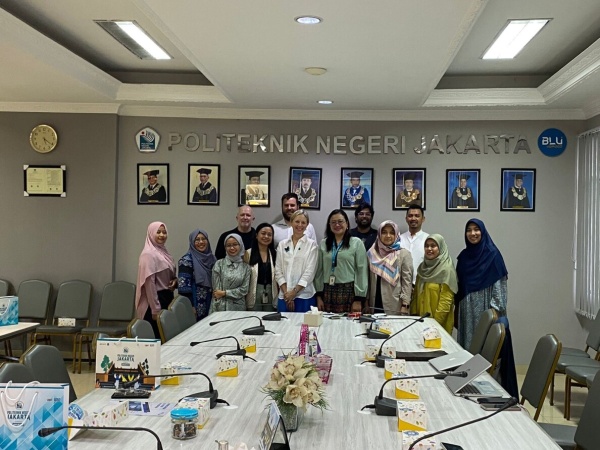
Meeting with Politeknik Negeri Jakarta (VET) Indonesia.
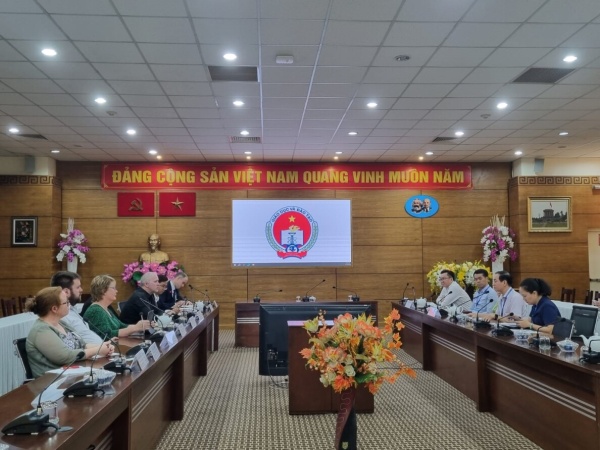
ENZ’s EdTech delegation meeting with Mr. Nguyen Bao Quoc, Deputy Director (Digital Transformation), and colleagues at the HCMC Department of Education & Training, Ho Chi Mihn City, Viet Nam.
The delegation also attended the EDUtech Asia Policy Summit in Singapore where education, education policy makers and education technology solution providers came together from across Southeast Asia. Highlights included:
- The pace and scale at which many SEA countries are upskilling and shifting their policy and philosophy to equip their educators, citizens and systems to be meaningfully productive.
- That digital literacy training is not just the domain of learners. Educators also need high quality digital training, materials and resources.
- Artificial Intelligence is forcing a rethink on everything and in assessments, what do we care about assessing? Knowledge attainment or the deep skills for being human?
- Partnership is hard but offers competitive advantage and ‘’success’’ when human skills are done well, and many global universities are doing partnership well and reaping the rewards.
Any New Zealand EdTech and Education publisher companies interested in finding out more about the SEA market can contact Alana Pellow - alana.pellow@enz.govt.nz
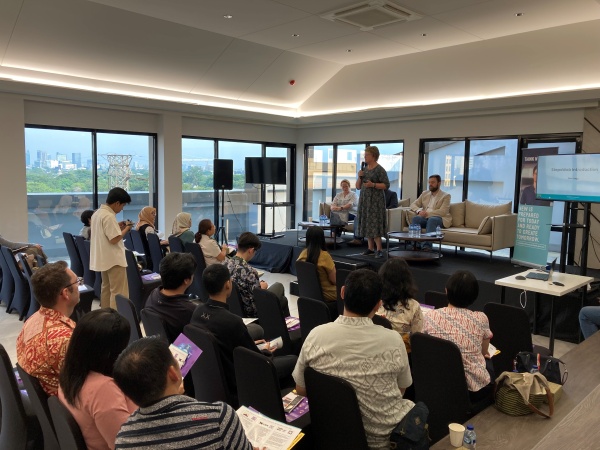
ENZ’s EdTech delegation meeting with Mr. Nguyen Bao Quoc, Deputy Director (Digital Transformation), and colleagues at the HCMC Department of Education & Training, Ho Chi Mihn City, Viet Nam.
-
From the CE: A monumental year
Tēnā koutou katoa,
December already! Where did the past 12 months go?
The good news is that the effort that you have all put into this sector, that we are all so passionate about, has delivered results. My team tell me that enrolments for the first eight months of 2023, and the 12 months since the borders opened, have almost topped 60,000 (59,306 to be exact) and that the number of visa applications is much higher. From where we were when the borders opened this is significant and tangibly real, positive progress. It is also a positive indication for the future as many of these learners will be staying on into next year and are the foundation on which we can build further growth.
That said there is still much to do.
The recovery is not spread evenly across all sector participants and not spread evenly across New Zealand. While, at the time of writing, ENZ is yet to receive its letter of expectation from the new Government, international education was included as a manifesto focus area and I expect we will get very clear direction as to our role in continuing the recovery. This is good news too. Getting clear direction from Government enables us to know exactly what is expected and to focus our efforts accordingly.
In the short time that I have been in the CEO role, I have come to understand the importance of focus. There has never been and never will be a shortage of opportunities when it comes to international education. It is a matter of identifying the opportunity that delivers the impact and focusing our attention there. I look forward to receiving the new Government’s direction and delivering to it alongside our many partners.
The past 12 months have also been significant in the area of scholarships – the Prime Minister’s Scholarships for Asia and Latin America and the Manaaki New Zealand Scholarship Programme. Our scholarship programme was also bought to a standstill by COVID-19 and is itself recovering and recovering well. In 2023 more than 250 New Zealanders have been recipients of a Prime Minister’s Scholarship and more than 900 people from across the Pacific and Asia have participated in the Manaaki New Zealand Scholarship Programme with another 400 in the pipeline. As you know, ENZ administers these on behalf of the Ministry of Foreign Affairs and Trade. Both programmes successfully build enduring connections between New Zealand and our offshore partners and contribute to our communities here at home.
For all of us, our colleagues and our whānau, 2023 has been a monumental year. There is much that we can, and should, look back on with pride and satisfaction. On behalf of everyone at ENZ, I’d like to thank you for your support and for the huge amount of effort and work that has been achieved this year. I look forward to working with you in 2024 to continue the momentum towards an international education sector that is sustainable, resilient, and innovative, and of high value for students, providers, and all of New Zealand.
Ehara taku toa i te toa takitahi engari he toa takitini
It is not the strength of one person alone, but the strength of many that contribute to our success.
Ngā mihi,
Linda Sissons
Acting Chief Executive -
Our name

The Kākā (a parrot native to New Zealand) as it carried the Manapou (fruit kernal) on its journey to New Zealand. This images features in the welcome area of ENZ's Wellington headquarters.
Education New Zealand’s Māori name is metaphorical and tells a story which is embedded in our brand and Ngā Manapou (our values) and how we work as an organisation.
Te whakapapa o Manapou ki te Ao – the genealogy of our Māori name – goes back to 2018 when ENZ’s Māori advisory team developed Rautaki Māori (our Māori Strategy). The name was endorsed in 2019 by the then Minister of Education.
· Manapou – refers to the fruit kernel that nourished and sustained the Kākā (a parrot native to New Zealand) as it carried the seed in its crop on the journey from Hawaiki to Aotearoa.
· Ki te Ao – the word ‘Ao’ means the ‘world’ and also refers to the ‘dawn’. In Māori cosmogony, the idea of ‘Ao’ signifies dawn or a new beginning every day, new experiences, opportunities and learnings.
Manapou ki te Ao describes how Aotearoa New Zealand education nourishes and empowers students and enables them to be the world’s next generation of problem solvers.
Our name and the story are embedded in ENZ’s Manapou ki te Ao colour palette:
· the deepwater blue represents the flight of the Kākā over the ocean
· the surface blue stands for approaching land over shallow water
· the Manapou orange is the Manapou stone brought by the Kākā
· the East Coast sand colour alludes to the sandy shores of Aotearoa.
-
Submissions to Covid-19 inquiry welcome
The Royal Commision is welcoming submissions to the Inquiry from anyone impacted by the COVID-19 pandemic. This includes international education providers and international students.
Submissions from international students currently in New Zealand, and those who have now returned home, are eligible to participate. To learn more about how you can share your experience visit: Royal Commission of Inquiry into COVID-19 - Citizen Space.
The survey closes on 24 March 2024.
- New Zealand welcomes its international students in 2024!
-
New Zealand Traveller Declaration toolkit
The New Zealand Traveller Declaration (NZTD) is an online system that travellers can use to answer questions on travel, customs, immigration, and biosecurity information before they arrive in New Zealand. The earliest travellers can submit a declaration is 24 hours before starting their trip to New Zealand. Once they have submitted a declaration, they will receive an email telling them what they need to know when they enter New Zealand. Travellers need to complete a declaration for any dependents they are travelling with, including children and infants.
The New Zealand Customs Service has prepared a toolkit for promoting the NZTD to networks, customers, communities and in workplaces. In this toolkit, are factsheets posters, videos, flyers, forms, social media tiles and copy available in various languages including Hindi, Japanese, Korean, Punjabi, Simplified and Traditional Chinese, Spanish, Vietnamese, Portuguese, French and German.
For more information on the traveller declaration process, please visit this page here - About | New Zealand Traveller Declaration.
*Paper forms will continue to be available for travellers who cannot complete the form online and will be accepted as a paper-based version of the digital NZTD at the air border.
-
PIF Recipient: Financial education platform for secondary schools
Founded in 2015, Banqer set out to tackle the global challenge of financial illiteracy. The team knew that school students were missing out on practical and engaging financial education, partly from a lack of curriculum-aligned resources, and partly from time-poor schools and teachers struggling to deliver financial education on top of everything else.
Research shows that 75% of us believe schools aren’t doing enough to combat financial illiteracy, and with financial education widely seen as a ‘circuit breaker’ for intergenerational inequality, something needed to change. That’s where Banqer’s award-winning platform came in. Through an online simulation, Banqer introduces students – from primary school through to secondary – to financial concepts like budgeting, savings, careers, insurance, renting, home ownership and investment.
"We've seen firsthand the engagement and impact that Banqer creates in New Zealand secondary school classes, and are excited to take this to the world with the support of Education New Zealand,' said Kendall Flutey, Co-Founder and CEO of Banqer
A step-change from textbooks or written resources of the past, Banqer helps students learn by doing. Learners explore their own simulative economy where they create fictitious bank accounts, earn income, pay expenses, invest, insure, budget and more.
Banqer is one of the recipients of the International Education Product Innovation Fund – an initiative funded by the New Zealand Government’s Covid Response and Recovery Fund and managed by ENZ, New Zealand’s dedicated agency for international education.
With Banqer’s platform already widely used by schools across New Zealand, the company is looking to scale up its impact and innovation to create financial empowerment for more learners around the world.
Support from the Product Innovation Fund will help the company scale Banqer High (its platform for secondary school learners) across Australia and validate new markets, including in North America. The funding will also help develop Banqer Beyond, a new product which aims to bring Banqer’s financial education to a broader audience beyond schools, which could include workplaces, community settings, or direct to consumers.
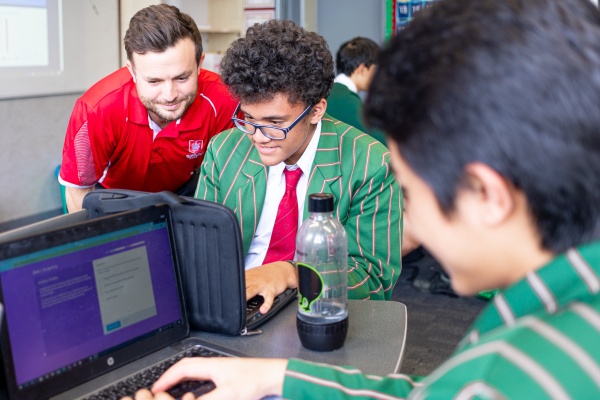
Banqer was a natural fit for the Product Innovation Fund, which is supporting seven pilot projects that deliver new, meaningful and unique learning experiences from New Zealand to the world. These pilots reimagine what a New Zealand education experience can look like and mean for global learners.
From New Zealand to the world, Banqer’s technology is setting learners on track for better financial futures. And thanks to the partnership between Banqer and ENZ, the stage is set for this New Zealand-built product to have an even greater impact around the world, delivering financial education and empowerment to learners wherever they are.
More information:
Learn more about Banqer.
-
PIF Recipient: Blue Tomorrow
A new online offering from AUT Ventures is set to immerse learners worldwide in one of the greatest challenges – and opportunities – of our times: the blue economy. More importantly, it aims to give learners the confidence to take their next steps towards a rewarding career and an education pathway that builds a more sustainable future for humanity and the ocean.
The blue economy describes marine activities that generate economic value and contribute positively to ecological, cultural and social well-being. ‘Blue Tomorrow’ is an innovative learning experience that will guide learners through the blue economy’s mission, careers and pathways.
Blue Tomorrow is a pilot project developed jointly by AUT Ventures and Education New Zealand Manapou ki te Ao (ENZ), New Zealand’s government agency for international education. Through its International Education Product Innovation Fund, ENZ is supporting a range of pilot projects that reimagine how a New Zealand education can engage and inspire international learners and create impact through new delivery modes, approaches, and partnerships.
Blue Tomorrow was one of the first projects to be supported by the Product Innovation Fund and is a natural fit as innovation is both its cause and career lens. The approach positions New Zealand as a leader and champion for sustainable oceans, inspiring learners into a diverse range of career opportunities and the education pathways to get them there.
So why Blue Tomorrow? Globally, the blue economy is set to double in size by 2030. It is a natural fit with New Zealand’s identity as an island nation and a member of the South Pacific region, whose countries and peoples are intrinsically connected to the ocean. With 96% of its territories underwater, New Zealand has one of the world’s longest coastlines and largest exclusive economic zones, making it a hotspot for marine biodiversity. Aotearoa has the wisdom, obligation, and opportunity to lead the world toward the ocean we want.
To deliver this programme, AUT Ventures is partnering with Moananui, a collaboration of leading private companies, public sector entities, and research institutions, with the goal of transforming Aotearoa New Zealand into a world-leading ecosystem for developing and commercialising blue economy products, services, technology, research, and capability. For Moananui, Blue Tomorrow aligns with its mission to accelerate innovation and investment in Aotearoa’s blue economy to generate unparalleled economic, social, cultural, and ecological value.
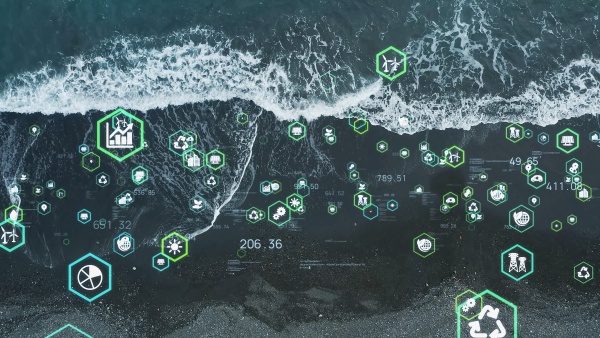
AUT Ventures is partnering with Moananui, a collaboration of leading private companies, public sector entities, and research institutions.
Modern learners are searching for a career in service of a cause, but the pathways to enter them are often unclear. Mission-led organisations require talent and leadership with a shared purpose to fill the domestic and global needs of the growing blue economy. Blue Tomorrow flips the traditional model around - purpose first, career second, and helps take care of the pathway puzzle. The online learning experience shows how the blue economy can lead to a financially rewarding career that contributes to shared global challenges and builds a more sustainable global economy.
In today’s climate, there is no shortage of challenges, from over-fishing and biodiversity loss to ocean warming and acidification. The importance of sustainable oceans, and the pressing need for action, are reflected in the UN Ocean Decade and Sustainable Development (SDG) Goal #14 – life below water. But developing the blue economy also presents immense opportunity, including the potential to address other SDGs, including zero hunger (SDG #2), decent work and economic growth (SDG #8), responsible consumption and production (SDG #12), and climate action (SDG #13).
The partnership with Moananui brings together commercial, public, and community partners from New Zealand’s blue economy who have global credibility and unique stories of innovations that are good for the planet to share with learners worldwide. Blue Tomorrow has the potential to become a widely known model for linking the blue economy’s growing demand for talent with respected education offerings from New Zealand providers, building awareness, and enabling action for a more sustainable future for the ocean.
Across four weeks of online learning, Blue Tomorrow will empower learners to find their own place in the blue economy. Unlike some traditional programmes designed to prepare learners for a specific career, sector or discipline, Blue Tomorrow aims to inspire learners around a cause – in this case, the blue economy. Local industry guests accompany learners on the journey that starts with an overview of ocean literacy and the blue economy. They then explore the blue economy sectors and take a deep dive into one (aquaculture in the pilot), where they investigate careers and pathways, including a taste of local learning (Te Pūkenga, NMIT’s sustainable aquaculture programmes in the pilot). The experience wraps up with learners reflecting on their inner development and planning for their next steps in the blue economy.
The blue economy is one of the biggest opportunities on the planet. Blue Tomorrow puts learners at the centre of this new frontier.

